CHHSM’s Heartland Conference Retreat on Emergent Leadership Brings Surprise, Spirit to Attendees
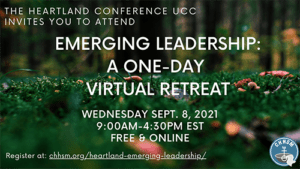
A recent virtual retreat on Emergent Leadership gave both participants and presenters hope for the future. Held virtually Sept. 8, the free retreat from the UCC Council for Health and Human Service Ministries (CHHSM) was attended by Heartland Conference staff, congregants, local church pastors, and the conference’s designated partner ministries.
The retreat was made possible by a grant from the Heartland Conference, and marked the third year in a row that the conference has provided a grant for a CHHSM-led retreat.
The day was wrapped in opening and closing worship services, with small group sessions complementing larger presentations in emergent strategy; Race Diversity, Equity, and Inclusion (RDEI); embodiment; and conflict and repair. The four sessions were led by various members of the CHHSM team, and each session built upon the previous one.
“Overall, the day gave me a sense of hope,” said the Rev. George Graham, vice president of CHHSM. “It was great to have a day apart with people from a wide array of settings in the Heartland Conference. I had a renewed sense of the vitality and variety of ministries within and beyond the conference.”
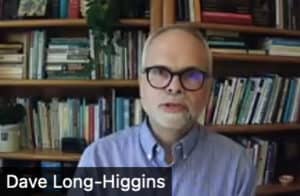
The Rev. David Long-Higgins, Heartland Conference Minister, agreed. “The entire day was a gift,” he said. “The presentations were not just information but formational, engaging each participant in insights and exercises that helped us experience what emerging transformational leadership feels like.”
The retreat invited much personal reflection, particularly about being in right relationship with change and growing the human soul towards justice and connection. During the opening emergent strategy session— which provided the overview for the day — the Rev. Dr. Elyse Berry, CHHSM’s associate for leadership and advocacy development, discussed the difficulty in unlearning the anti-nurturing culture that western civilization has taught in order to learn to practice interdependence and work for change and transformation.
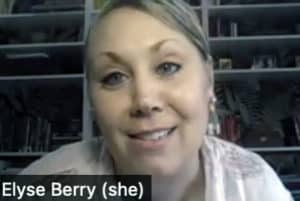
“Transformation doesn’t usually happen in a straight line,” she said. “It’s non-linear — circular, explosive, and tangled. And Mystery is always going to be a part of it.”
We recover and transform by our resilience, said Berry, paraphrasing Maya Angelou. “We all have a place of center, a place of God, that enables resilience,” she said, which opens the space to create new possibilities. Keeping your core intact and keeping a spiritual practice — embodiment and ritual — are two of the pathways to transformation, Berry said.
Berry, who organized the elements of the retreat, was encouraged by the participation of attendees. “The community of folks presenting and community of folks attending all had wisdom and depth and presence to share,” she said. “What worked best is the synergy that existed between the group and the content.”
The RDEI session began with an examination of RDEI principles by Paula Barker, CHHSM’s senior executive assistant for events and administration, that used CHHSM’s logo and work as an outline. In discussing each element of the CHHSM logo, Barker referenced the ways CHHSM has done the right thing, but also used the examples to ask the questions, “What is missing?” “What else could be?”
“How much do we commit to using each other as a resource for change?” she asked. “How much do we commit to allowing ourselves to be a resource for change?”
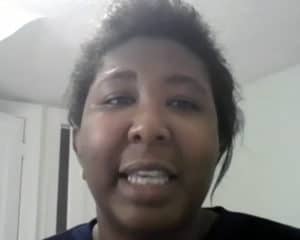
Barker referenced the CHHSM Team Agreements, one of which says, “We expect and accept discomfort. It’s going to messy.” Barker posited that the sentence needs exclamation points. “We’re going to mess it up on purpose. We’ve been called to get in good trouble. We’ve been called to disrupt. We will not have more of the same!” she said.
She closed by discussing organizational distinctiveness, the place where organizational work culture and ideals meet and drive each church or organization’s distinctive identity. Barker quoted Angela Davis, saying, “You have to act as If it were possible to radically transform the world, and you have to do it all the time.”
“I was struck by the quote by Angela Davis,” said Kyle Zanker, chief development officer of Crossroad Child & Family Services in Fort Wayne, Ind. “These are strong words to live by and really sets the mind toward any task that needs to be achieved. I feel like I can use this in many areas of my work and life.”
The second part of the RDEI presentation was a discussion of CHHSM’s work towards becoming Anti-Racist, presented by Graham and Michael Readinger, CHHSM’s president and CEO. In discussing the work CHHSM has done in the past 18 months in its work to begin dismantling systemic racism and white supremacy, Graham highlighted the June 2020 CHHSM board meeting, which took place right after the murder of George Floyd.
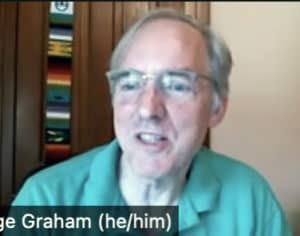
The night before the final day of the meeting, Graham — unable to sleep — drafted the beginnings of a statement he thought the CHHSM Board should make about systemic racism. Readinger set aside a good part of the final day’s agenda and the board and staff focused on editing and adding to the statement.
“We decided it shouldn’t be just a commitment, but a call to action,” Graham said. He then delineated the action items listed in the Statement on the Pandemic of Systemic Racism, which included personal, CHHSM team, and corporate actions (a financial commitment to fund grassroots anti-racism grants and conducting an RDEI Assessment).
Readinger discussed the RDEI recommendations. “We created an executive summary of the final RDEI report and asked the board what we could focus on in the near term.” The 10 items from the Board are guiding CHHSM’s current work, Readinger said.
“This is a campaign of disruption, not how we have done things in the past,” added Readinger. “RDEI impacts everything. You don’t realize how bad you are at it until you are made to realize how bad you are at it. You don’t realize where your growth edges are until you invite someone to take a look at you. It’s a breath of fresh air.”
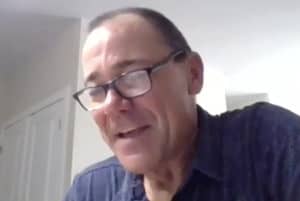
Graham agreed. “Our commitment to RDEI 15 months ago gave us a focus,” he said. For example, creating the CHHSM Fellow (held currently by Essence Ellis) — was an idea hatched due to that commitment.
“Without our commitment to RDEI, it might have happened, but the commitment made it clear that it NEEDED to happen,” Graham added. “As adrienne maree brown says, ‘What we pay attention to grows’ — making RDEI a focus has had an impact beyond what we expected.”
The RDEI information was helpful, said the Rev. R. Brooke Baker, senior minister of Church of the Redeemer UCC in Westlake, Ohio, but “the bigger lesson and translate-able idea is that growth comes from where you put your focus. As a local church pastor, this is important, because it’s easy to get caught in the minutiae. Remembering that what grows is where the focus is will be very helpful.”
The afternoon sessions were devoted to a deeper dive in emergent strategy elements. CHHSM Scholar Ellis discussed embodiment and Berry returned to examine conflict and repair in the last session before closing worship.
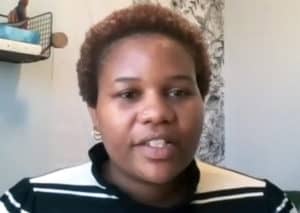
Individual embodiment focuses on becoming aware of practiced behaviors and feelings, said Ellis, as well as unlearning the ingrained notion of “mind over matter.” It requires developing a relationship to the rhythms and impulses of our own bodies.
Practicing individual embodiment allows people to build the meaningful and intentional beloved community, Ellis added. It allows people to understand and implement health boundaries and the space to explore the practice of love more critically, she said.
“I was especially drawn to the way in which paying attention to the energy of one’s body was such a helpful way of paying attention to feelings otherwise untended,” said Long-Higgins.
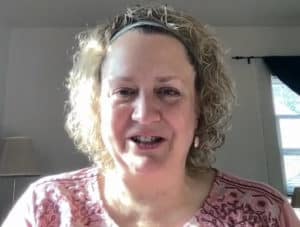
Redeemer UCC’s Baker found Ellis’ session on embodiment particularly thought provoking. “I think I learned the most from embodiment,” she said, “with the reminder that we worship an incarnate God — and yet we do not allow ourselves to feel an emotion, witness it, and allow it to move through our bodies. So often we stop it instead.”
Berry found Ellis’ workshop “deep, meaningful, thought-provoking and an invitation into a way of learning I don’t often get. The topics are staying with me or, perhaps rather, I’m staying with them. And that speaks to their value,” she said.
To begin the final session on conflict and resolution, Berry drew on a definition from The Embodiment Institute: “Conflict gives us the opportunity to clarify boundaries, deepen relationships, and open potential for repair. Conflict is one of the primary ways that we change and change things.”
The potential for repair and change depends on having accountability for the impact your actions have on both yourself and others, Berry said. She enumerated the four-part process of accountability — self-reflection, apologizing, repair (in which accountability leads to making amends and rebuilding trust), and the hard work of changing your behavior, which is more easily done with support from those around you.

The Rev. Monica Dawkins-Smith, CHHSM Board member and executive associate of communications and development for the UCC’s Wider Church Ministries, said she was most surprised by the conflict and repair session. “The concept of ‘accountability as generative, not punitive’ was thought-provoking and is one thing I would like to fully embrace as part of building better relationships in general,” she said.
Overall, Graham thought the retreat opened new ways to approach CHHSM’s anti-racism work. “Having a chance to look together at emergent strategy offered fresh approaches as we continue to grapple with the COVID-19 pandemic and work to address systemic racism,” said Graham. “I appreciated the opportunity to think about how we personally embody our commitments, deal with conflict, and work for repair.”
Throughout the retreat, participants’ often-vulnerable reactions to the various sessions and exercises were affirming and positive.
The Rev. Nicole Havelka, owner of Nicole Havelka Consulting, highlighted the small group break-out moments of the sessions. “The small groups were very useful in integrating and learning from main sessions and connecting with others,” she said.
Baker agreed. “The opportunity to participate in small groups allowed me to hear other voices and their wisdom, from people whom I might not have otherwise had the opportunity to engage,” she said.
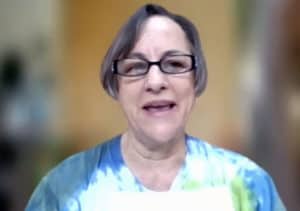
For Zanker, the most inspirational moment was the closing prayer from the opening worship, which was an invitation to be challenged, surprised, stretched, and committed. “I have printed this prayer and put it where I will see it often,” she said. “As a 26-year representative of Crossroad Child and Family Services, and as a member of the CHHSM Board, I have often received that invitation in the relationships I have been blessed with in my work; but this was a written collection of those words. It inspired me to keep growing, learning, and stretching for a lifetime.”
Dawkins-Smith also found the worship services meaningful in setting the tone of the day. “Nestled between two worship services — at the beginning and the end — the small group and large group elements felt worshipful and sacred, complete with rituals (confession and land acknowledgement, art and release),” she said. “The four modules tied together nicely with a common thread of building the beloved community by calling forth our best selves toward right relationships that nurture change and transformation.”
For Readinger, the most inspiring part of the retreat were the participants, and “the generous spirit of all attendees in sharing, listening, and being honest. The one-on-one conversations made me feel very close to people I did not know or knew only a little.”
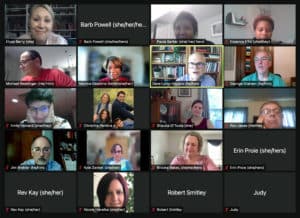
Readinger also found that “the mixture of all CHHSM staff being presenters in a variety of formats” worked well. “The flow of the agenda was a natural progression through gaining an understanding of what emerging leadership looks like, seeing an example of it, embodying it, and then managing the conflict (through repair) that may result,” he said.
Berry appreciated that participants were able to name specific portions of the retreat that were helpful to them. “When we asked, the answers came so quickly, and all of the topics were mentioned, too,” she said. “That says a lot, when it’s not just a generic, ‘Well, this was nice.’ Rather, folks could name specific things that stayed with them.”
“For me, the retreat was about practicing liberation in the here and now, and through authentic connection with ourselves, our bodies, our communities, and our world,” Berry added.
After the retreat, Long-Higgins reflected on the day’s events.
“Emerging leadership is not ‘one thing,’ but an intersection of engagements formed in vulnerable openness to the new thing that yearns to come alive, even — and maybe especially — when it feels as though things are coming apart at the seams,” Long-Higgins said. “This makes everything potential clay for the formation of new vessels for life and for ministry. It is a continual process nurtured by a God who never stops creating, repairing, and drawing forth resurrections, large and small.”
Join Our Mailing LIst
"*" indicates required fields
Follow on Facebook
Bethany Children’s Home Hosts Annual Summer Concert Series with Unique Fundraising Twist - CHHSM
www.chhsm.org
Bethany Children’s Home in Womelsdorf, Pa., is hosting its annual Summer Concert Series, but this time with a special mission in mind: all proceeds will help build a new outdoor recreational complex...